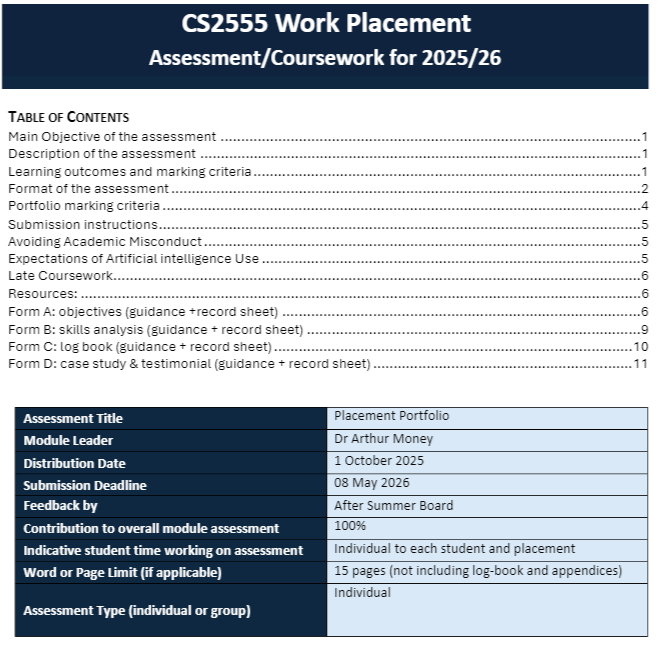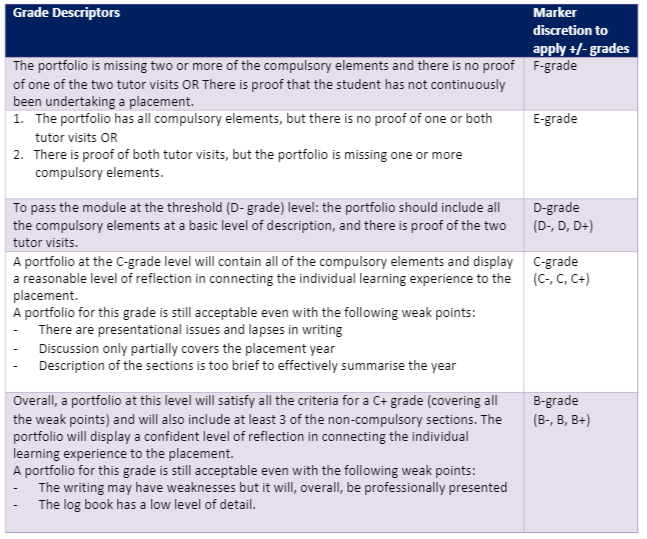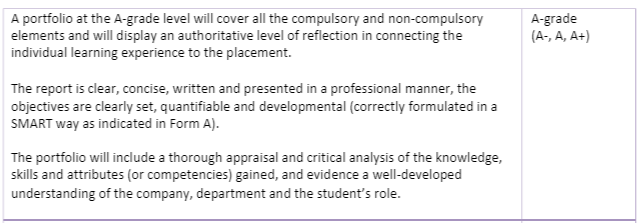| Category | Assignment | Subject | Computer Science |
|---|---|---|---|
| University | Brunel University London | Module Title | CS2555 Placement Portfolio |

The placement portfolio will be used to assess the extent to which you’ve met the module’s learning outcomes during your placement year.
You will be required to complete two visits with your placement tutor. In addition, you must submit a placement portfolio, details of which are given below. A work placement prize (£200) will be awarded to the student with the best performance (grade) in the placement module. This will be selected from the portfolios that are graded A* only.
The portfolio will assess you against the following learning outcomes (LOs):
LO1: Produce a set of SMART personal objectives to plan for work-based learning
LO2: Keep accurate records of industrial activity as a means of tracking professional development
LO3: Reflect on skills and experience gained from evidence of work-based learning
LO4: Conduct yourself professionally in the work environment and in your contact with the Placement Tutor.
LO1: Objectives
Because all placements are different, you must set yourself a number of personal objectives and a challenge objective to help you achieve the learning outcomes above. You need to find a balance between the requirements of the role in which you are employed and your own personal objectives. These objectives are central to your placement assessment. You should set them early in collaboration with your Placement Tutor and manager, and you should review them frequently. Some companies may have their own internal process that requires you to set objectives and evaluate them.
LO2: Log Book
You are required to keep a record of your personal development throughout the course of your placement. This is formalised within your reflective portfolio as a log-book detailing industrial activity. Ideally, this should provide evidence of work-based learning throughout the placement, including reflection against your personal objectives.
LO3: Skills Assessment
There are numerous ways in which you can reflect on the skills that you have gained through work-based learning. The reflective portfolio will require that you provide evidence that you have assessed your work skills, e.g., by completing the skills assessment form (Form B). Your workplace may also provide a system for assessing your skills – if this is the case, then the work-based assessment can also be included as evidence of having met LO3.
LO4: Contact with Tutor and Tutor Visits
In addition to professional conduct within the workplace, you must:
Stuggling Your CS2555 Assignment? Deadlines Are Near?
Hire Assignment Helper Now!1. You must arrange two tutor visits and record them on WISEFlow.
2. Visit 1 must take place by 30 November 2025. You should contact your tutor and agree the date no later than 1 November 2025.
3. Visit 2 must take place by 30 March 2026. You should contact your tutor and agree the date no later than 1 March 2026.
4. After each visit is completed, your placement tutor should send you a copy of the Placement Visit Report with the placement tutor section completed (copy blank form available on Brightspace). You should then complete your section at the end of the form and submit this on WISEFlow to confirm that the visit has been completed.
5. There will be four separate WISEFlow submissions to keep a record of the visits:
6. Arranging the visits, meeting the deadlines, and completing all four Flows on WISEFlow are your responsibility.
7. Copies of Visit Date Agreement Form and Placement Visit Report are provided on Brightspace FORMAT OF THE ASSESSMENT The portfolio should be no longer than 15 pages (NOT including the title page, the table of contents, the log book and the appendices), Arial font 11pt, single line spacing and a layout of A4 Borderless (21 cm x 29.7 cm).
Make sure you do not exceed the maximum length, otherwise you will be marked down! (see the marking criteria). Each placement portfolio will vary due to the different working environments.
The following are a set of elements to be included in the portfolio.
There are 9 parts marked as compulsory, which means as a minimum (for passing the module), your report must include these sections.
1) Contents Page (compulsory) – An index of the whole report. Use a separate list for tables/figures (maximum one page).
2) The Company (compulsory) – Present a brief, general description, giving history, size, markets, mission, services, etc., and the area, department, section, team that you work in and their responsibilities (maximum one page).
3) The Projects (compulsory) – For each project you have worked on (and it may only be one), mention the design methods/software tools used, problems encountered and their solution. Avoid low-level detail (e.g., sections of code) unless absolutely necessary for the understanding of a particular point. If it was a team project, clearly state your contribution to the project (maximum two pages).
4) Objectives (compulsory) – Four personal objectives should be set: three basic objectives and one challenge objective. Basic objectives enable you to achieve the placement learning outcomes. Challenge objectives go beyond this and require a level of autonomy to self-manage a task or project, and require you to demonstrate critical analysis. These should be submitted using Form A, included in the Resources section below. You can define more objectives during your placement, but you should include only those that offer sufficient depth. Including more superficially defined or irrelevant objectives will not guarantee a higher grade and may weaken your submission (maximum two pages).
5) Links with academic activity (compulsory) – Relate the content of modules studied in the Department of Computer Science at Brunel, to placement activity you have engaged in. How well prepared were you for placement projects in terms of skills required and the discipline of the workplace? You may (briefly) consider each module you have studied, linking it to placement activity (maximum one page).
6) Skills required – Mention any skills that you didn’t have but that would have been useful. How difficult was it to learn them in the context of your existing experience? What additional modules would have been of benefit? Describe any research which you did in order to improve your knowledge and skills for the projects that you undertook during the placement. Discuss how the placement has influenced your choice of final-year modules and of the topic for your final-year project (maximum one page). 7) Skills Analysis (compulsory) – Will be provided by completing Form B, provided in the Resources section below. You will have to complete two sets of skills analyses, one at the beginning and one towards the end of your placement (but before the due date of the portfolio submission), showing how you improved on those skills that were deemed critical at the beginning of the placement (maximum two pages).
8) Log book (compulsory) – Will be completed using Form C, provided in the Resources section below. This form doesn’t count towards the page limit of the portfolio, but please be as concise and clear as possible.
9) Case Study and Testimonial – A final round-up of the key successes or otherwise of the placement and of the benefits that you have gained from your industrial year that you could use to inform future students using FORM D, provided in the Resources section below (maximum one page).
10) LinkedIn profile – Include a link to your LinkedIn profile as an electronic CV and demonstration of your online employability
11) Evaluation (compulsory) – a concise, reflective, critical appraisal of the placement year. Demonstrate how each learning objective (LO1, LO2, LO3, LO4) has been achieved through the placement experience and other influential impacts on your placement. You should indicate what you have learnt whilst on placement and give evidence of what you did on placement which supported your learning. Please note that you should be focused on the learning for the activities you did whilst on placement not on the actual placement work itself. You should draw on the material provided in the appendices to the report to evidence your learning. You may address problems faced and overcome, mistakes made and their consequences, achievements and responsibilities, technical and non-technical skills learned, quality and deficiencies of technical artefacts constructed, different approaches that you would have tried in the light of current knowledge, major achievements of which you are proud, and your analysis of your contribution to the IT function of the company. Additionally, you might address the nature of the industrial/academic supervision, provide a discussion of the objectives set and their outcomes, and give analysis of your thoughts, feelings and personal developments through the year (maximum two pages).
12) List of References (compulsory) – You can draw on a wide range of sources including textbooks (in addition to those in the recommended reading list), the company’s website, other relevant websites and academic journal articles and magazines to develop your discussion (maximum one page).
13) The Training/Appraisal – Outline the company's training programme for new entrants. Describe and evaluate any formal training (courses) and informal training (on the job) you have received. Most companies will have an appraisal scheme which may be applied to placement students/interns. Describe any appraisal scheme. If you were appraised, describe the outcomes and discuss any subsequent actions (maximum one page).
14) Links with industrial activity and employability – Describe how your placement year will influence your future career development and employability profile. How can the skills you’ve learned be taken forward into a future workplace? Identify any additional skills that you are lacking and describe how you are planning on addressing these shortcomings (maximum one page).
15) Appendices i) Evidence/samples of work, appraisal forms, or other supplementary material to which your report refers.
To pass the module (i.e., to obtain a D- grade or higher), all LOs must be evidenced in the portfolio submission. The requirements for specific grades are set out below. The final grade is as a result of academic judgement made by your marker:


Buy Answer of CS2555 Assignment & Raise Your Grades
Pay & Buy Non Plagiarized AssignmentIf you are worried about the CS2555 Placement Portfolio Assignment? then no need to worry anymore! Our experts provide computer science assignment help that has been designed for the students. You will get expert guidance and help on assignments that will strengthen your concepts. We also provide you with free assignment samples that will help you understand. And the best part? All the content is 100% original, written by PhD expert writers, and well-researched, so that you get the best quality. So don’t delay now; boost your grades with our help!
Hire Assignment Helper Today!
Let's Book Your Work with Our Expert and Get High-Quality Content
